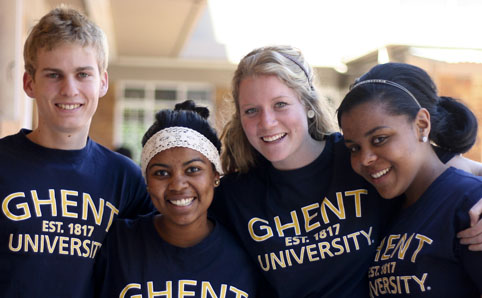Latest News Archive
Please select Category, Year, and then Month to display items
05 June 2018
Photo Supplied
 Archaeological excavations in the Wonderwerk Cave, north of Kuruman in the Northern Cape.
Archaeological excavations in the Wonderwerk Cave, north of Kuruman in the Northern Cape.
Research fellow Dr Lloyd Rossouw from the Department of Plant Sciences at the University of the Free State (UFS) recently published an article in the Nature Ecology and Evolution journal with Dr Michaela Ecker from the University of Toronto as lead author, and Dr James Brink, research fellow at the UFS Centre for Environmental Management. The findings described in “The palaeoecological context of the Oldowan-Acheulean in southern Africa” provides the first extensive paleoenvironmental sequence for the interior of southern Africa by applying a combination of methods for environmental reconstruction at Wonderwerk Cave, which have yielded multiple evidence of early human occupation dating back almost two million years ago.
Where water once was
The Wonderwerk Cave is found north of the Kuruman hills (situated in Northern Cape) a 140m long tube with a low ceiling. The surroundings are harsh. Semi-arid conditions allow for the survival of only hardy bushes, trees, and grasses. But during the Early Pleistocene, stepping out of the Wonderwerk Cave you would have been greeted by a completely different site, the researchers found. Using carbon and oxygen stable isotope analysis on the teeth of herbivores (Dr Ecker), fossil faunal abundance (Dr Brink), as well as the analysis of microscopic plant silica remains (phytoliths) excavated from fossil soils inside the cave (Dr Rossouw), the results show that ancient environments in the central interior of southern Africa were significantly wetter and housed a plant community unlike any other in the modern African savanna.
What difference does it make?
While East African research shows increasing aridity and the spread of summer-rainfall grasslands more than a million years ago, the results from this study indicate an interesting twist. During the same period, shifts in rainfall seasonality allowed for alternating summer and winter-rainfall grass occurrences coupled with prolonged wetlands, that remained major components of Early Pleistocene (more or less the period between one and two million years ago) environments in the central interior of southern Africa. That means our human ancestors were also living and evolving in environments other than the generally accepted open, arid grassland model.
Historic Global exchange summit for first-year students in 2012
2011-10-21
 |
More than one hundred Kovsie first-year students travelled to universities in the USA and Europe in September 2011 to learn about issues such as diversity, leadership and citizenship. More students will travel to Asia in January 2012. Daniel King, Melissa Lucas, Jomari de Beer and Rito Madingana visited Ghent University in Belgium.
Photo: Anja Aucamp |
Our University will present a global exchange partner summit next year with the 16 partner universities who took part in this year’s Leadership for Change Programme. This will be the first summit of its kind presented in South Africa bringing together first-year students from four continents and 17 countries. The summit will take place from 8 - 22 July 2012 on the Bloemfontein Campus.
The aim of the summit is for first-year students from all partner universities in the USA, Europe and Asia to visit our university and experience student life at a South African university. The students will be staying on campus and an intensive programme covering issues such as social justice, diversity, leadership and citizenship will be presented.
Mr Rudi Buys, Dean of Student Affairs at our university, says the summit will serve as an opportunity to detail further partnership agreements with a number of universities such as Binghamton State University, amongst others.